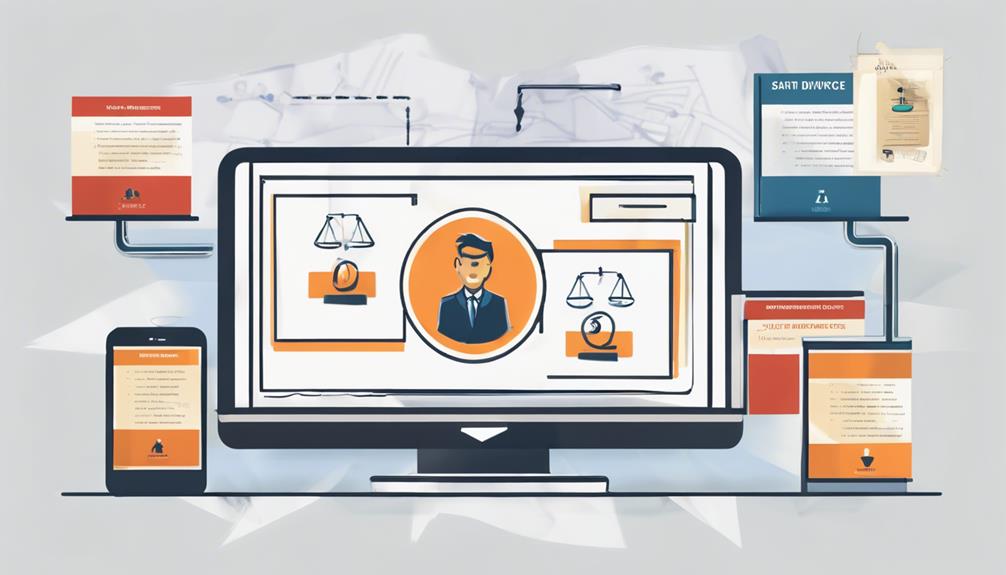When contemplating the possibility of divorcing without the need for court intervention, one may view it as a more peaceful route to ending a marriage. The appeal of steering clear of the confrontational aspects of legal proceedings and retaining a level of autonomy over the situation can be very attractive.
However, there are additional factors to consider that go beyond just the ease and convenience of this approach. By exploring the nuances of opting for a non-court divorce, one can uncover hidden advantages that might not be immediately apparent but could play a crucial role in shaping the outcome of the separation.
Key Takeaways
- Preserve privacy and confidentiality while avoiding exposure of intimate details.
- Save on legal fees, reduce emotional stress, and foster a peaceful resolution.
- Utilize alternative dispute resolution methods like mediation and negotiation.
- Benefit from a simplified process with fewer court appearances, lower costs, and quicker resolution.
Benefits of Divorcing Without Court
Why should we consider divorcing without court when seeking to end a marriage? Opting for an uncontested divorce outside of court offers numerous benefits that can make the process smoother, faster, and more amicable for both parties involved.
One significant advantage is the preservation of privacy. By resolving personal matters outside of a public courtroom, couples can maintain confidentiality and avoid unnecessary exposure of intimate details. Additionally, choosing a collaborative and cooperative approach fosters a more peaceful resolution, reducing stress and emotional turmoil often associated with court proceedings.
Moreover, divorcing without court can lead to substantial cost savings. Compared to contested divorces that involve lengthy litigation and attorney fees, an uncontested divorce generally incurs significantly lower legal expenses. This financial relief can be especially beneficial during an already challenging time of transition.
Cost Savings and Flexibility

To achieve significant cost savings and greater flexibility in divorce agreements, opting for a process outside of court can be a strategic choice. By negotiating outside of court, couples can save thousands of dollars in legal fees and court costs. This approach allows for more personalized agreements tailored to the specific needs of both parties, fostering a sense of control over the outcome.
Moreover, resolving matters without court intervention reduces emotional stress and conflict often associated with adversarial proceedings. The ability to address issues directly and collaboratively can lead to a quicker resolution without the delays inherent in court scheduling.
Furthermore, choosing a non-court route ensures privacy and confidentiality in handling sensitive divorce matters. This discretion can be crucial for individuals seeking to maintain their personal affairs outside of public scrutiny. Overall, the cost savings, flexibility, emotional benefits, and efficiency gained from avoiding court make it a compelling option for those looking to navigate the divorce process with greater ease and control.
Alternative Dispute Resolution Methods
Exploring alternative dispute resolution methods, such as mediation and collaborative divorce, offers couples a constructive path to resolving issues outside of court. These methods focus on negotiation and compromise, aiming to reach mutual agreements without the need for a trial. Here are some key points to consider:
- Mediation: Involves a neutral third party who facilitates discussions between spouses to find common ground and craft solutions.
- Collaborative divorce: Emphasizes cooperation and problem-solving, striving to minimize conflict and promote a more amicable separation.
- Negotiation: Essential in both mediation and collaborative divorce, where spouses work together to find compromises that work for both parties.
- Time-saving: Choosing alternative dispute resolution can save time compared to traditional court proceedings, allowing couples to efficiently move forward with their lives.
Simplified Divorce Process Overview

Moving from exploring alternative dispute resolution methods to the simplified divorce process overview, couples can navigate their separation with greater ease and efficiency by opting for an uncontested divorce. Uncontested divorces involve minimal court appearances, reducing legal fees and adversarial proceedings. This streamlined process allows couples to reach agreements outside of court, leading to a quicker resolution and a more amicable separation. By choosing uncontested divorce, individuals can maintain privacy and have more control over the divorce proceedings without the need for extensive court involvement.
| Benefits of Uncontested Divorce | |
|---|---|
| 1. Fewer court appearances | |
| 2. Lower legal fees | |
| 3. Amicable separation | |
| 4. Increased privacy | |
| 5. Quicker resolution |
Opting for an uncontested divorce can simplify the process, enabling couples to make decisions together and move forward with their lives efficiently. By avoiding courtroom battles, couples can focus on resolving their differences in a peaceful and constructive manner.
Tips for Smooth Divorce Proceedings
Utilizing effective communication and reaching agreements on key issues can significantly contribute to smooth divorce proceedings. When aiming for a faster resolution and a smoother transition, consider the following tips:
- Opt for an uncontested divorce: By mutually agreeing on major issues like asset division and child custody, you can avoid lengthy court battles and streamline the process.
- Utilize mediation: Seeking help from a neutral third party can aid in conflict resolution and facilitate constructive discussions.
- Create a settlement agreement: Formalizing agreements on important matters can provide clarity and prevent misunderstandings down the road.
- Hire experienced attorneys: Professional guidance is invaluable in navigating legal complexities and ensuring your interests are protected throughout the process.
Frequently Asked Questions
Who Loses More Financially in a Divorce?
We understand the concern about financial losses in a divorce. Both parties can experience financial strain in court proceedings. Avoiding litigation through uncontested divorce may help us save money, maintain control over decisions, and minimize financial impact.
Who Is Usually More Financially Affected by Divorce?
Who is usually more financially affected by divorce? Women often face a 41% income drop post-divorce, while men see a 33% increase. Factors like caregiving duties and lower earning potential contribute. Planning and support are vital for women navigating financial impacts.
How Do You Gracefully Divorce?
We gracefully divorce by fostering respectful communication, prioritizing understanding, compromise, and the well-being of any children. Seeking support from professionals like mediators or therapists can guide us through this journey of mutual agreement and positive outcomes.
How Do I Deal With a Sudden Divorce?
Dealing with a sudden divorce requires swift action and emotional support. Seek legal advice, gather crucial documents, and consider mediation. Protect your interests and focus on self-care. We'll guide you through this challenging time.
Conclusion
Divorcing without going to court is like taking a shortcut to happiness. It's like bypassing a traffic jam and arriving at your destination with ease.
By choosing alternative dispute resolution methods, you can save money, maintain privacy, and make the process smoother.
It's like hitting the fast forward button on a difficult chapter of your life, allowing you to move forward and start fresh sooner rather than later.










